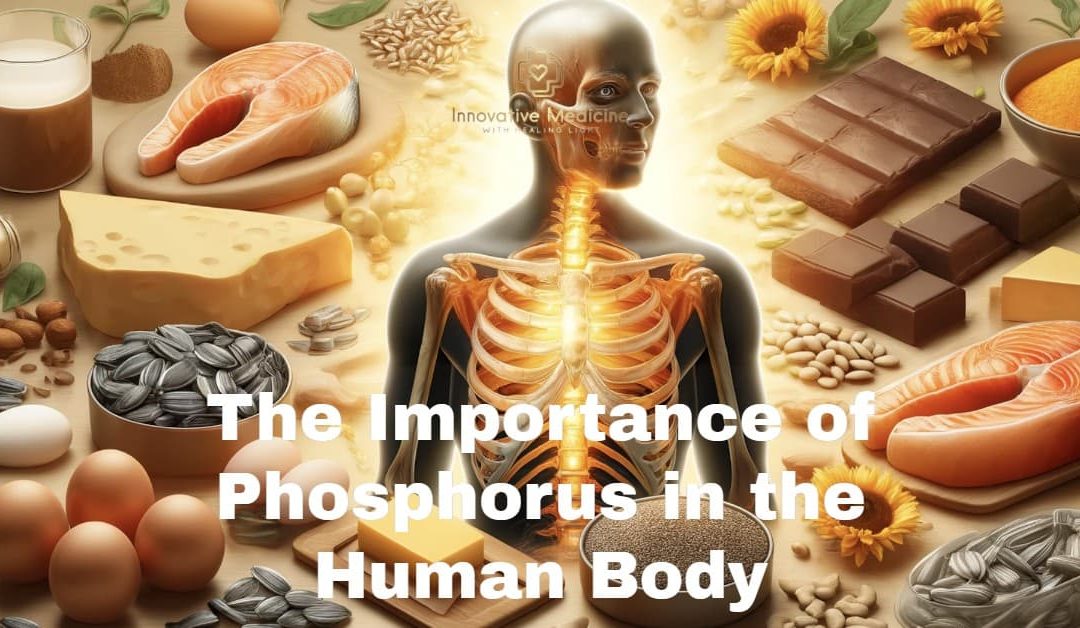Phosphorus is a mineral that, although it is mainly found in teeth and bones, is also found in all body cells, being the second most abundant mineral in our body. This is one of the minerals that the body needs to perform various functions that allow it to maintain itself and develop properly. This can be obtained through food, and its deficit is rare in developed countries. What’s more, most adults exceed the recommended daily allowance. However, both deficiency and excess can cause various health complications.
Understanding Minerals
Each mineral performs a specific function and, although they do not provide energy, they are essential to keep the body functioning in the best conditions. In a person, they represent almost 4% of body weight: 85% of phosphorus is located in the bones and teeth, while the remaining is found in soft tissues. Essential minerals are those that the body cannot synthesize by itself. Therefore, it is essential to acquire them through diet by consuming a wide variety of foods. However, like vitamins, they are elements that the body requires in minimal quantities. There are two types of minerals: macrominerals – the body needs them in amounts greater than 100 mg per day, such as calcium, phosphorus, magnesium, sodium, potassium, chlorine, and sulfur – and microminerals, trace minerals or trace elements – necessary in quantities less than 100 mg daily, such as iron, copper, zinc, chromium, selenium, boron, cobalt, fluorine, iodine, manganese and molybdenum.
The Importance of Phosphorus in the Human Body
Its primary function is the elaboration of tissues:
- They are essential components of bones and teeth.
- They are part of organic substances such as hemoglobin.
- They regulate the water balance inside and outside the cells.
- They intervene in the production of hormones and in most of the chemical reactions in which enzymes participate.
It is essential for the formation, development, and maintenance of bones and teeth and the proper functioning of muscles (including the heart) and nerve signals. It is part of DNA (genes) and constitutes some lipids, proteins, and carbohydrates. It also fulfills a fundamental task in storing energy and employing a molecule called ATP or adenosine triphosphate. It also works together with the B complex vitamins and has a relevant role in kidney function.
Quantity Required
The recommended daily needs vary depending on age:
- 275 mg/day in the range of 7 to 12 months
- 1,250 mg / day between 9 to 18 years
- 700 – 800 mg/day in adults or lactating women over 18 years of age.
To obtain the recommended amounts, the best way is to eat a balanced and varied diet. Although in a more significant proportion in animal origins, it can be found in all foods, such as eggs, meats (beef, pork, chicken, turkey, and game), fish, shellfish and crustaceans, and milk and derivatives, especially cheeses. Furthermore, a diet with adequate amounts of calcium and protein also supplies a sufficient proportion of phosphorus. Among plant foods, nuts, dried fruits, cereals and derivatives, and legumes stand out. Keep in mind that whole wheat bread and cereals contain more of this macromineral than those made with refined flour; however, it is stored in a not absorbed form.
On the other hand, fruits and vegetables only provide small amounts of phosphorus. Also, preservative additives and phosphates and their derivatives, used by the food industry, are a dietary source of this mineral.
Bones, Muscles and Beyond
Phosphorus is necessary to keep bones, muscles, and cells in good condition, but its functions in the body go further. For example, phosphorus combined with calcium contributes to the growth, maintenance, and repair of damaged cells; is involved in the body’s production and use of energy; promotes movement during muscle contraction and helps reduce pain after exercise; filters waste from the kidneys and is part of the nucleic acids DNA and RNA. As these are fundamental functions, it is important not to incur an excess or a lack of it, as both cases can cause harmful effects on the body.
Keep the Balance Right
Phosphorus and calcium balance the body, and an excess or deficiency of one affects the ability to absorb the other. Due to its availability in many foods, a deficiency is rare in the population of developed countries. Symptoms such as loss of appetite, anorexia, anemia and decay, respiratory failure, pain, and muscle weakness can prevent ambulation, prone to infections, cardiac or neurological disorders such as irritability, seizures, or coma be a sign of hypophosphatemia.
At the opposite pole is hyperphosphatemia, when this mineral’s levels increase above 5 mg/dl (in the blood). It is a disorder caused by excess phosphate in the blood that can also lead to weakness and pain in muscles and joints. This condition can also involve itchy eyes and other symptoms such as nausea, vomiting, and diarrhea. However, its most significant implications relate this condition to a greater probability of suffering from cardiovascular problems and being a risk factor for mortality in people with kidney failure.
Foods Highest in Phosphorus

To ensure adequate intake in adults, it is essential to know which foods this mineral is present. In this way, it will be easier to moderate to avoid an excess or lack of it. Phosphorus is usually found in many foods for daily consumption, so it is rare to have a deficit, as we have seen previously.
- Salmon: Most animal-origin foods are a source of this mineral, and salmon is no exception. In this fish, you will find above all minerals essential to take care of your health.
- Sunflower seeds: You may not have expected that sunflower seeds were an important source of phosphorus. These seeds have a large amount of phosphorus: nothing more and nothing less than 1100 mg per 100 g.
- Egg: In the case of eggs, it must be taken into account that this mineral is concentrated in the yolk, where we can find up to almost 600 milligrams per 100 grams.
- Dark Chocolate: Chocolate is a food highly appreciated for its flavor and also for its nutritional values. Now, it is crucial to consume the right kind and in the right amount. A 3.5 ounce serving has over 300mg of phosphorus.
- Cheese: Dairy products, in general, contain significant amounts of this mineral. So if you have kidney problems, it is better to limit its consumption since you will not eliminate it correctly.
In addition to these, there are processed meats, soft drinks, industrial pastries, fast food, and pre-cooked dishes that usually have added phosphates, which can increase the amount of this mineral consumed in a day by between 300 and 1,000 milligrams.

